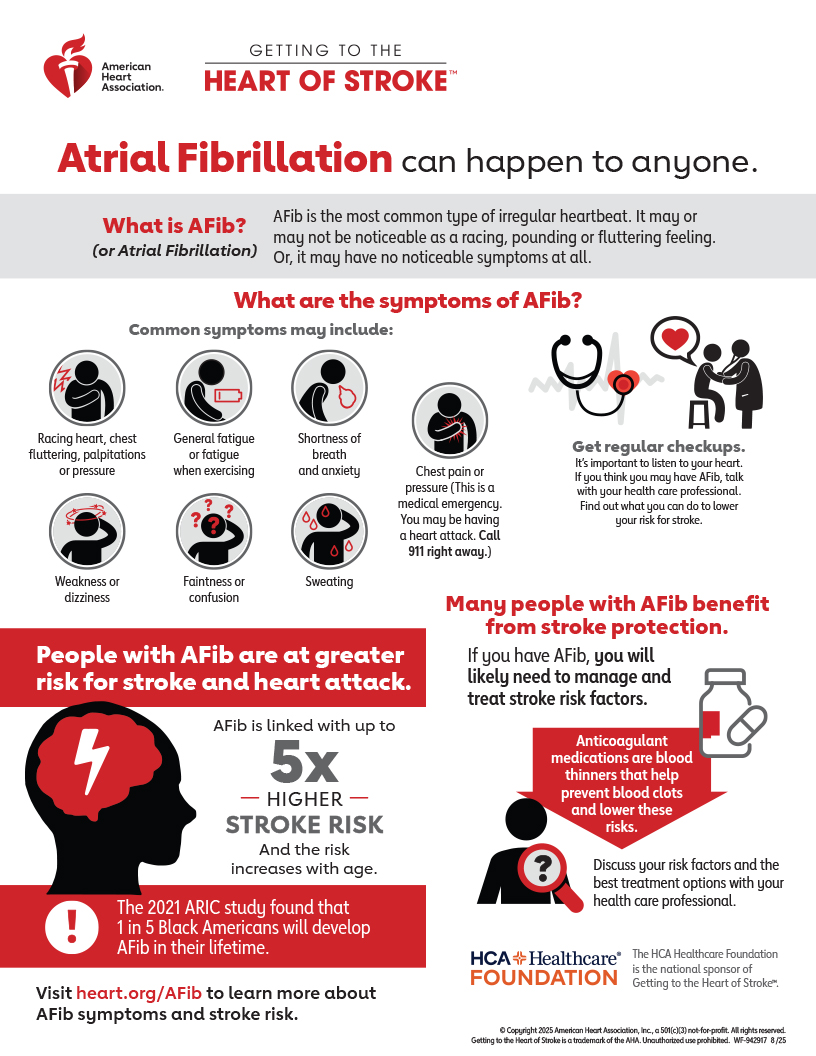New research finds 62% of AFib patients were unaware of the condition before diagnosis.
The American Heart Association urges the people of Tampa Bay to learn the signs of atrial fibrillation and take steps to protect their health.

Atrial fibrillation, or AFib, often goes unrecognized despite affecting millions and increasing stroke risk by up to 5 times.
New consumer patient research from the American Heart Association, conducted by The Olinger Group, finds that most people with AFib (62%) had no prior knowledge of the condition before being diagnosed. During September, AFib Awareness Month, the American Heart Association, a relentless force changing the future of health for everyone everywhere, is raising awareness nationwide about the condition, and that early identification and treatment of AFib are critical to stroke prevention.
Anyone can develop AFib, and risk increases with age. It is important to know the signs and risk factors:
-
- Recognize AFib symptoms and risks. Irregular heartbeat is a common symptom of AFib, while high blood pressure and family history are key risk factors that increase the likelihood of developing the condition.
- AFib is manageable and treatable. With the right plan you can lower your stroke risk and live fully.
- You are not alone on your AFib journey. Find support and connect with others at MyAFibExperience.org.
AFib is a quivering or irregular heartbeat that can lead to blood clots, stroke, heart failure and other heart-related complications. According to the latest statics from the American Heart Association, the heart rhythm disorder (arrhythmia) affects over 6 million people in the U.S., and that number is expected to double by 2030.
“AFib can often go unnoticed, which is why early identification and timely treatment are so important. We encourage people to talk with their healthcare team to understand their personal risk and take proactive steps to manage their heart health,” says Mark Starnes, DO, a cardiovascular disease specialist at the HCA Florida Heart Institute in Largo, Florida.
To better understand this growing public health issue, the Association conducted a nationwide online survey of 1,200 participants, including 770 patients with AFib and 430 caregivers, between January and March 2025. The study assessed awareness of the condition, as well as motivations and barriers to treatment
The findings reveal gaps in public knowledge about AFib and highlight areas where increased awareness is essential to promote earlier recognition and diagnosis of the condition.
Learn the signs and risk factors
Symptoms can vary widely or be completely absent. Many people associate AFib with a racing or irregular heartbeat, however, other symptoms like shortness of breath, fatigue, dizziness, chest pain or fainting may occur.
While anyone can develop AFib, risk increases with age and is higher among people with uncontrolled high blood pressure, Type 2 diabetes, who are overweight, have had a prior heart attack or a family history of the condition.
According to the research, AFib patients reported experiencing an average of three symptoms before receiving a diagnosis, highlighting the need to recognize early warning signs, understand personal risk factors and discuss them with a health care professional.
Managing AFib
Being diagnosed with AFib may feel overwhelming. However, with the right care plan, you can effectively manage AFib and reduce your risk of stroke and other complications.
Collaborating with a health care team helps patients understand their specific type of AFib and develop a personalized plan. Treatment options for AFib may include medication, procedures and lifestyle changes such as weight management, increasing physical activity, quitting smoking and managing conditions like high blood pressure to support long-term health.
Support is within reach
You’re not alone on your AFib journey. People living with AFib and caregivers can find support and connect with others through the American Heart Association’s online community MyAFibExperience.
This AFib Awareness Month, take action and inspire change by understanding the signs of AFib and talking to your health care team to manage your risk factors. Learn more at Heart.org/AFib.
The HCA Healthcare Foundation is a national sponsor of the American Stroke Association’s Together to End Stroke® initiative and AFib Awareness Month. The research was sponsored by the American Stroke Association, a division of the American Heart Association, with funding support from the HCA Healthcare Foundation. M





